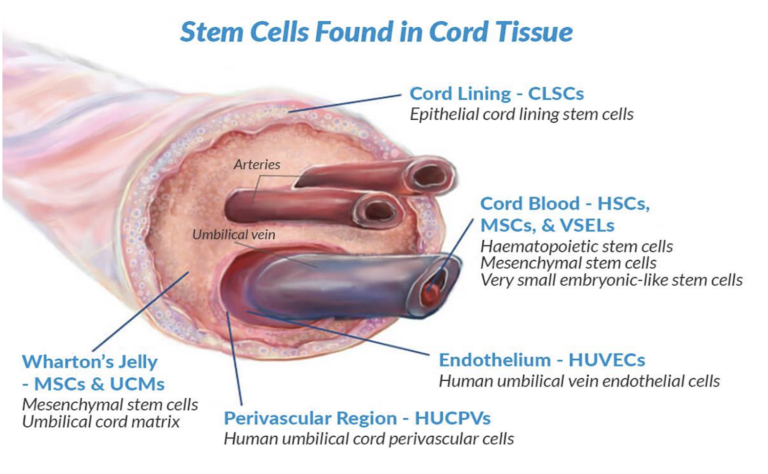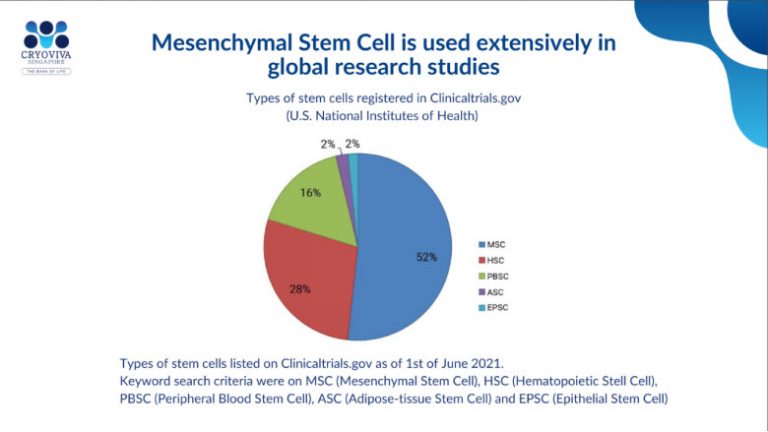What is stored in the Cord Tissue


What is Wharton’s Jelly?
Wharton’s Jelly is a clear, mucous tissue that insulates and protects the umbilical arteries and vein.
The Wharton’s Jelly of the human cord is unique among connective tissues as it contains only Mesenchymal Cells that make up the functional myofibroblasts of the tissue and their predecessors.
In brief, Wharton’s Jelly consists of mucopolysaccharides (sugars) in cord tissue comprises primitive Mesenchymal Stem Cells (MSCs), the multipotent stromal cells that can differentiate into a variety of cell types, including osteoblasts (bone cells), chondrocytes (cartilage cells), myocytes (muscle cells) and adipocytes (fat cells). Although these are found in adult tissues, especially in bone marrow, the MSCs in Wharton’s Jelly are the most primitive source with very high regenerative potential.

Mesenchymal Stem Cells
Human MSCs (hMSCs) are the non-haematopoietic, multipotent stem cells with the capacity to differentiate into mesodermal lineages such as osteocytes, adipocytes and chondrocytes as well ectodermal (neurocytes/neurons) and endodermal lineages (hepatocytes/liver cells).
Mesenchymal Stem Cells are one of the most promising aspects of research and is increasingly being employed in regenerative medicine to treat Spinal cord injury, Cartilage injury, Brain injury, Wound healing, Rheumatoid Arthritis, Multiple sclerosis, Myocardial infraction, Alzheimer, Diabetes, etc.
Besides MSCs are considered as an immune privileged cell in consequence is being utilized in allogeneic organ transplantation, graft versus host diseases (GVHD) and efficient homing for the hematopoietic stem cell transplantation engraftment.

Advantages in use of Mesenchymal Stem Cells (MSCs)
MSCs are multipotent stem cells that can differentiate into a variety of cell types, including: osteoblasts (bone cells), chondrocytes (cartilage cells) and adipocytes (fat cells).
Here are some key facts about MSCs and why transplant of MSCs is gaining greater acceptance in the treatment of various health conditions and diseases.
- Mesenchymal stem cells are capable of self-renewal and differentiation into various connective tissue lineages.
- Mesenchymal stem cells (MSCs) have been isolated from bone marrow, periosteum, trabecular bone, adipose tissue, synovium, skeletal muscle and deciduous teeth
- These cells have the capacity to differentiate into cells of connective tissue lineages, including bone, fat, cartilage and muscle.
- MSCs can also express phenotypic characteristics of endothelial, neural, smooth muscle, skeletal myoblasts, and cardiac myocyte cells.
- When induced into the infarcted heart, MSCs prevent deleterious remodeling and improve recovery
- Clinical use of cultured human MSCs (hMSCs) has begun for cancer patients, and recipients have received autologous or allogeneic MSCs
- MSCs can be used allogeneically, delivered systemically, and differentiate into a cardiomyocyte-like phenotype when implanted in healthy myocardium
- MSCs can be readily transduced by a variety of vectors and maintain transgene expression after in vivo differentiation.
Want to understand more about the use of MSCs and the benefits of cord blood banking? Contact us now for a no-obligation consultation with one of our experienced consultants.
We store cord tissue as a whole, which basically includes MSC, EPSC, and other derivatives. This will allow clients to have the best option and technology available at the time of expansion.
FAQ's
Cord Tissue Stem Cells are specialized cells found in the Umbilical Cord’s Wharton’s Jelly. These cells have the potential to repair, regenerate, and heal damaged tissues.
Cord Blood contains Hematopoietic Stem Cells used mainly for blood-related conditions, while Cord Tissue contains mesenchymal stem cells useful for tissue repair, regeneration, and future Cellular Therapies.
Storing Cord tissue provides access to Mesenchymal Stem Cells that may support future treatments for conditions involving Cartilage, bones, muscles, and immune disorders.
Yes. Cryoviva follows strict international standards, advanced processing methods, and secure Cryogenic storage to ensure maximum cell viability and safety.
In many cases, yes. Mesenchymal Stem Cells are known for lower rejection risks, making them potentially suitable for parents or siblings, depending on medical compatibility.
Many treatments are in clinical trials, and research is expanding rapidly. Preserving cord tissue ensures your family is prepared for future medical advancements.
When stored in optimal Cryogenic conditions, Stem Cells can remain viable for decades, preserving their Therapeutic potential long-term.


